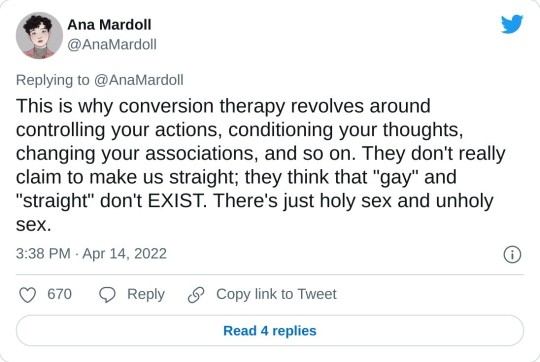#and in conclusion Foucault can go fuck himself
Explore tagged Tumblr posts
Text

This helps crystallise some of my unease at the backlash I see fairly regularly -- sometimes from randoms on Tumblr, but also from actual historians -- against many LGBT readings of history. This is where it all leads.
I've seen a cutesy uwu cartoon about how a medieval monk is actually more progressive than you, because he doesn't believe in "putting people into boxes." Which is of course a terrible thing to do. Even though some people have fought pretty hard for those boxes.
I've seen historians who are deeply offended at the idea that there could be anything homophobic about resisting the notion that, say, a passionate exchange of letters between two people of the same gender at least potentially indicates a sexuality we would understand as queer. "I'm not saying they were straight either!" they insist. "I'm just saying they didn't understand themselves that way and so you are being harmful if you say apply those terms to them! They didn't categorise people as gay and straight! You are being anti-intellectual if you think there is anything problematic about the idea that these identities only pop into being as they are named. " Even assuming, for starters, that it's true to say that until very recently no one really understood themselves as [whichever LGBT+ identity]...
Isaac Newton didn't understand himself as being autistic. And it is quite fair to say we can never know with absolute and final certainty if he was autistic. But we can say that autistic people existed in his time, even if unknown, and there is reason to think Newton might have been one of them. The fact that that the category was not established at the time does not mean that autistic people recognising him as perhaps one of their number are doing anything unreasonable. The idea that autistic people did not exist until they were named does not apear to be particularly widely accepted as far as I''m aware-- and thank goodness, because it is a profoundly troubling one.
The thing is "I'm not saying they were straight, I'm rejecting straightness AND gayness AND everything in between as valid categories!" isn't some academic lens that only apply to historical figures. It is highly current, applied by real, living people, to real, living people. And it tends to suck:

There are exceptions, but most people -- even homophobes -- can agree that it's unfair to blame someone for something that's genuinely an inherent, inborn part of their nature. So they don't, in their own mind, persecute gay people for being gay, they don't accept that orientation of any kind exists in the first place. They believe that people are simply choosing to act a certain way. They could choose not to, and therefore it is reasonable to hold them accountable for those choices. It is therefore kind of a lot when you insist that we must not merely be aware of this belief, but effectively share it when examining same-sex relationships in the past. A frequent extension of the idea that people in the past perceived sexuality only as an action, not an identity, and that we must discard all other lenses when examining the past, is that it was also not that bad to be subject to the explicit prohibitions placed on sexual/romantic relationships between people of the same gender.
"They thought it was a sin, but not a worse sin than say, lying! Or having the wrong kind of straight sex!" Again, this is an entirely modern attitude held by (at least) millions of people.

Have you talked to anyone about what it feels like to be on the receiving end of it? When there will never be any non-sinful way you can act on your sexuality? When falling in love puts you, at best, in the same category as someone obsessed with the desire to lie or to steal? (And it is worth mentioning that "theoretically not worse than [minor sin x]" does not necessarily guarantee that two sins were treated as equivalent in practice. They certainly aren't now.)
It's not wrong to remind us this way of thinking exists and has existed for a very long time, but it is galling to see it as held up as liberating or even kind of cute, when it's functionally indistinguishable from the TERF quote which prompted this whole post. Now, there can be a tendency to exaggerate the miseries of the past: all women were married at 12 (and somehow tight-laced to the point of fainting regardless of period) no one knew how to wash, and all queer people's lives were defined by oppression and possibly burnings-at-stake. Of course it is worth correcting that. Of course it is important to explore the way that queer people did manage to thrive as well as the institutional burdens placed upon them. But to do that you have to be able to name them, and to recognise continuities both in identities and in suppressions of them. Finally, before someone says otherwise -- I am not saying we have necessarily arrived at a final, perfect end point in our understanding of sexuality and identity! I understand myself as an ADHD, bi woman. The traits that lead me to identify myself thus existed before I found names for them and, I assert, would exist if I had never found them. But if some future age is able to look at those traits and others I am unable to even pinpoint, and armed with greater knowledge and precision they say "maybe, she was actually what we would call [x]" -- fine! Good! In fact I ardently hope someone comes up with a more accurate name for the appallingly inadequate and clumsy "ADHD". But, these inner experiences are real, they are part of me as they have been part of uncountable people throughout history, whether named or not.
55 notes
·
View notes